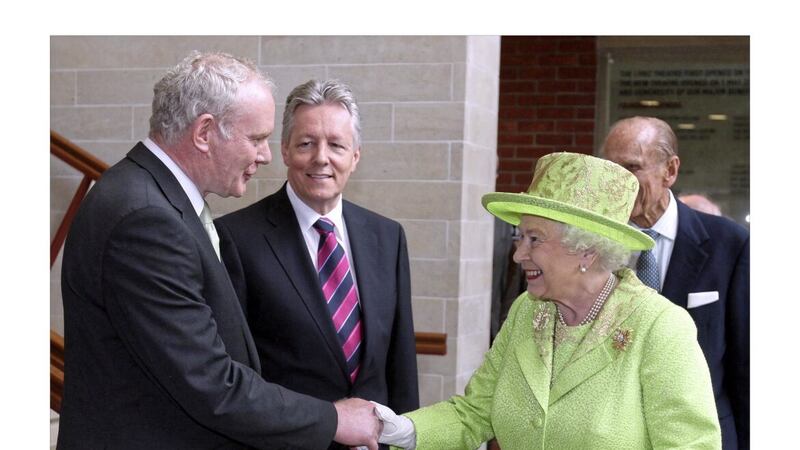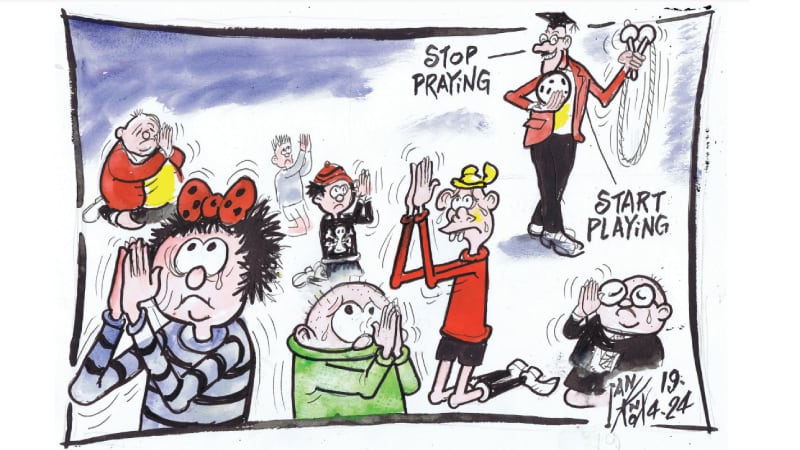AS IRISH people, many of us have an ambivalent attitude towards the queen.
Those of us who have lived through the Troubles began as young men and women with that natural dislike of teenagers towards authority, and there was no greater symbol of authority than the queen of England.
Time passed, we matured, and the queen hung on longer than most of us thought she would. While we grappled with the reality that a united Ireland was not just around the corner, Little Englanders in the Shires had to deal with the fact that the empire was gone – Elizabeth was no longer head of an empire on which the sun never set, and that England would have to take its place among all the other ‘third-rate’ countries.
When the British and the Provos had fought each other to exhaustion and the Catholics had achieved equality in Northern Ireland, we were all left with that imponderable question: “what was all the fighting about?”
Then there was the follow-on question: “Who does the talking on behalf of the nationalist people in the building of reconciliation?”
There is something that not many nationalists had taken into account – the queen’s own journey in life.
With the handing back of control to nations in Africa and Asia the queen had gone through her own journey of loss.
Then there was her personal journey of faith, a faith which she began to openly proclaim, especially in her Christmas messages in recent years.
Perhaps the loss of empire and the humiliation of Great Britain left the queen more open to experiencing God in her life, but whatever it was, by the time peace was being made here, she was the ideal person to hold out the hand of friendship towards enemies.
Meeting Martin McGuinness and that famous four-second handshake was an historic moment for us all.
As an unelected head of state, the queen had no baggage to carry, no constituency to pander too and no fear of being slated as a turncoat.
Her dignity of long years of service shone through, just as McGuinness’s maturity as a leader and potential statesman had grown through the years of the Troubles.
The queen had lost an empire – Martin McGuinness had failed to achieve a united Ireland. They stood as equals, two people whose dreams had been shattered.
And in all these isles there was no-one better to shake hand and begin the process of peacebuilding.
TURLOUGH QUINN
Portglenone
Co Antrim
Keeping united Ireland on the long finger
TAOISEACH Michéal Martin has said much recently regarding a united Ireland, castigating all who see things differently.
Michéal has been in politics for a lifetime and what has he done about it? If it weren’t for those campaigners who he says were the loudest and fought the British and rotted in jails and died on hunger strike, Michéal Martin would still be doing nothing about it.
It always was and still is about keeping it on the long finger, the same policy as the DUP – might as well be in the one party.
The taoiseach’s greatest achievement, while being seen mingling with world leaders, has been to secure his own future as he passes the same on to Leo Varadkar in the carve-up of power, all the while there has never been a squeak about the three-quarters of a million-plus nationalist republicans quarantined in the British colony deprived of their nationhood.
These are the same people who have suffered decades of harassment, torture and death while having their homes and property looted and wrecked by the RUC and British army and their loyalist satellites without recompense.
Now Mr Martin has the audacity to tell us we don’t have a right to be heard. Reality is the taoiseach and his mates, both past and present with a small number of exceptions, have squandered the past century and with time fast evaporating they are helpless.
That is why Michéal Martin has nothing left to offer except pious platitudes and waffle. Michéal, you can now look forward to the nightmare of the quagmires and perils that lie ahead.
LAURENCE O’NEILL
Martinstown
Co Antrim
Cultural one-upmanship
QUEEN Elizabeth’s physical body has died but her consciousness lives on.
The response to the ‘death’ of the queen is somewhat polarised in Northern Ireland with some people’s cultural conditioning leading them to feel a kind of mock triumphalism, while others having undergone a different type of cultural conditioning will feel a sense of bereavement.
The majority of people of whichever persuasion will probably feel indifferent. It should be remembered that the conflict in Northern Ireland originated with an issue of freedom.
One socio-economic grouping feeling left out of the workings of government and their culture sidelined while another socio-economic grouping feeling their power, privilege and culture constantly under threat from internal and external forces.
That conflict has largely been neutralised by nondiscriminatory laws being passed, consensual powersharing and a declining politico-religious influence. But the cultural conditioning largely continues within each political aspirational grouping.
The queen’s passing provides solely another opportunity for cultural one-upmanship amongst, let’s face it, the less enlightened sections of society within both tribal camps.
LOUIS SHAWCROSS
Hillsborough
Co Down
Memorable moment
MY FAVOURITE memory of the queen was when she met Martin McGuinness and he asked her: “Are you well?” And she replied: “Well I’m still alive.”
It’s nice to know we can laugh about these things.
DOMINIC GALLAGHER
Glenavy
Co Antrim








